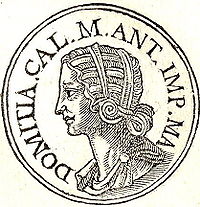- Domitia Lucilla
-
Domitia Lucilla Minor (Minor, Latin for the younger) sometimes known as Domitia Calvilla or Lucilla (died 155-161), was a noble Roman woman who lived in the 2nd century.
Lucilla was the daughter of Domitia Lucilla Major (Major Latin for the elder) and the patrician Publius Domitius Calvisius Tullus Ruso and was a niece to Lucanus Domitius. The maternal grandfather of the younger Lucilla, Lucius Catilius Severus served as twice consul and became city Prefect. Lucilla’s father served as consul in 109 and the date of his second consulship is unknown.
Lucilla through her mother had inherited a great fortune and had acquired her mother’s wealth. Her inheritance included a tile and brick factory near Rome and was close to the river Tiber. The factory provided bricks to Rome’s most famous monuments including the Colosseum, Pantheon and the Market of Trajan. The factory sold bricks to France, Spain, North Africa and all over the Mediterranean.
Lucilla married Marcus Annius Verus, a praetor, who came from a wealthy senatorial family. Verus’ sister Faustina the Elder was a Roman Empress and married the Roman Emperor Antoninus Pius. Verus was a nephew to Roman Empress Vibia Sabina and his maternal grandmother was Salonina Matidia (niece of Roman Emperor Trajan).
With Verus, they had two children, a son, the future Roman Emperor Marcus Aurelius (26 April 121) and a daughter Annia Cornificia Faustina (122/123-between 152-158). In 124, her husband died. Her children were raised by herself and they were adopted by her father-in-law. Marcus Aurelius would later inherit the tile and brick factory.
In Lucilla’s household, the future Roman Emperor Didius Julianus was educated there and through her support he was able to start his legal career. Lucilla was a lady of considerable wealth and influence. In his Meditations, Marcus Aurelius describes her as a ‘pious and generous’ person, who lived a simple life (1.3n). She spent her final years living with her son in Rome.
External links
- Roman Coinage of Domitia Lucilla
- Marble portraits of Domitia Lucilla, under the heading for Marcus Aurelius
Nerva–Antonine family tree
- (1) = 1st spouse
- (2) = 2nd spouse (not shown)
- (3) = 3rd spouse
- SMALL CAPS = posthumously deified (Augusti, Augustae, or other)
- dotted lines indicate adoption or (in the case of Hadrian and Antinous) alleged lovers
Marcia TRAJANUS PATER NERVA (r. 96–98) Ulpia MARCIANA TRAJAN, adoptive son (r. 98–117) PLOTINA Aelius Afer Paulina Major Libo Rupilius Frugi (3) MATIDIA L. Vibius Sabinus (1) Rupilia Annia M. Annius Verus Rupilia Faustina SABINA HADRIAN, adoptive son (r. 117–138) ANTINOUS Paulina Minor Domitia Lucilla M. Annius Verus M. Annius Libo FAUSTINA ANTONINUS PIUS, adoptive son (r. 138–161) Aelius, adoptive son Julia Paulina Cornificia MARCUS AURELIUS, adoptive son (r. 161–180) FAUSTINA Iunior Aurelia Fadilla two infant sons Salinator VERUS, adoptive son (r. 161–169) Fadilla Cornificia COMMODUS (r. 177–192) nine other children Lucilla Categories:- Ancient Roman women
- Nerva-Antonine Dynasty
- 2nd-century Romans
- 2nd-century deaths
Wikimedia Foundation. 2010.

